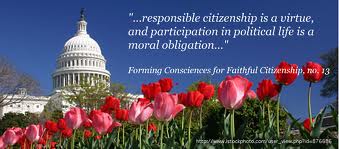In today’s vitriolic political culture of sound bites and partisanship, it’s not always easy as Catholics to practice our call to faithful citizenship. The public square may be filled with partisans, but the Church’s social teaching is consistent and neither “left” nor “right,” “liberal” or “conservative,” Democrat or Republican. As people of both faith and reason in a world often at odds with our values, our guiding star is Christ’s commandment to “love one another” rather than any alternative ideology.
How can we offer an authentic Christian witness in the public square when the world seems to respond best to a simplistic approach to political participation? The U.S. Catholic bishops tell us to respond by supporting a consistent ethic of life and by avoiding two temptations in civic life.
The first temptation is to fail to make a moral distinction between different kinds of issues involving human life and dignity. The second temptation is to focus on one or two moral issues (such as abortion or preserving marriage) and ignore other serious threats to human life and dignity.
Not all issues have equal moral weight. Some involve intrinsic evil, and are therefore incompatible with love of God and neighbor. Abortion, euthanasia, human cloning, destructive experimentation on human embryos, and efforts to redefine marriage fall under this category. They are never OK and must be rejected. Moreover, among acts that are intrinsically evil, those that directly attack life itself are the foremost violations of human dignity. The right to life is our first right and must be defended with maximum determination.
Other issues involve using the virtue of prudence to determine the best solution to a particular problem. We must alleviate poverty, but how we do so is a matter of prudential judgment (see Para. #33). So, too, are questions about whether to abolish the death penalty, or providing immigrants a path to citizenship. Our Faith compels us – before we consider political parties or TV and radio talk show hosts – to seek guidance first from our shepherds: our Pope and bishops. Consider the death penalty. While the Catechism maintains that states have the right to impose the death penalty when that is the only way to adequately protect society, most recent popes as well as the United States bishops have also argued strongly against its use, saying the cases where it is needed today are “are now very rare, even non-existent practically.” The bishops’ guidance in a prudential matter is not simply one opinion among many, and must be prayerfully considered above all else.
While certain issues (such as doing all we can to save 4,000 children from being aborted each day in our country) have a special claim on our consciences, we can’t ignore other issues, such as the death penalty, economic injustice, and discrimination. These are not “optional concerns which can be dismissed” (see Para. #29). Because all people have inherent dignity as individuals created in the image of God, the Church teaches us to ensure the rights of workers, immigrants, parents and families are protected.
Sadly no political party can check of all the boxes in these areas of Catholic concern. So what can we do?
First, listen to our Church, which offers us a 2,000-year-tradition of social and moral teaching. Secondly, prayerfully consider first what our Pope and bishops say in matters that involve Catholic social teaching. A well-formed conscience (not what we feel or think but God’s voice resounding in our human hearts) is essential to make sound moral judgments.
As we take our place in the public square, let our measure be our Faith as Catholics, not our political loyalties. It won’t be easy, but we will have Faith—and God—on our side.
###
